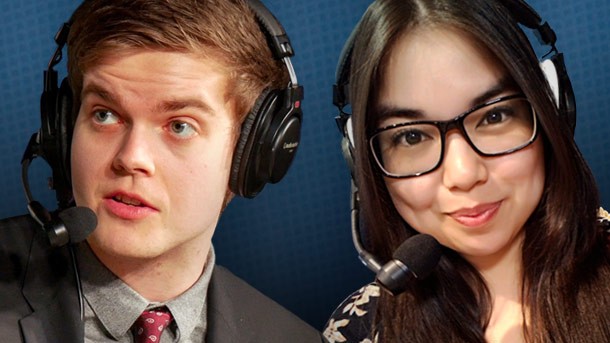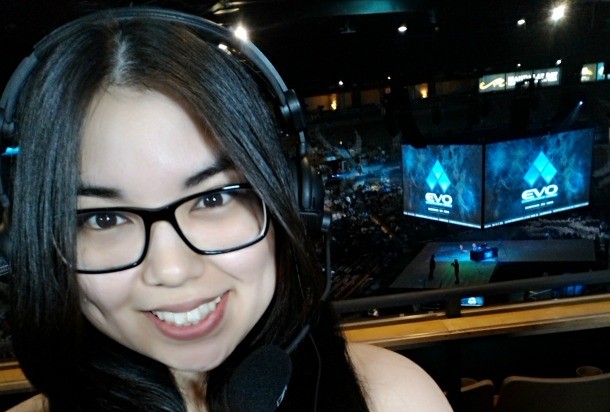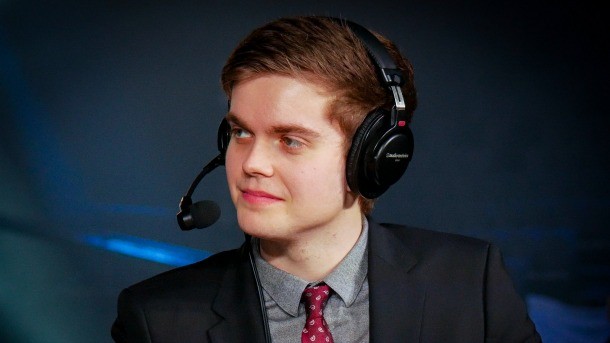What It’s Like To Be An eSports Commentator

Photo credit: Samantha Hancock and Jorien van der Heijden.
In this month’s issue of Game Informer we dove into the world of eSports, detailing how players, teams, and sponsors work with each other to make sure people who excel at games like Street Fighter, Halo, and more can make a living off their skills. Here at Gameinformer.com, we’re also taking a look at some of the peripheral aspects of eSports vital to understanding the world of competitive gaming.
Fans come to eSports for the players, but commentators can make them stick around. Good play-by-play commentators and analysts can contextualize exciting moments and help newer viewers learn the games, storylines, and rivalries that transform competitive scenes from a fleeting hobby to something worth investing in long-term.
To learn more about eSports commentating, I spoke with Owen “ODPixel” Davies (a recent up-and-comer in the Dota 2 scene) and Samantha “Persia” Hancock (one of the world’s most prominent Marvel Vs. Capcom commentators) about what their respective scenes are like, what skills make for good casting, and how viable a career as a commentator really is.

Samantha Hancock. Photo credit: Samantha Hancock.
Amateur Hours
Davies got into Dota 2 in 2012 and discovered its competitive scene the following year, but he was skeptical about the idea of eSports at first. “I remember thinking, ‘Why would anyone watch this game? If you like the game, you play it. Why would I care to watch people play it?’” As he watched more matches and listened to other commentators hype up the action, however, it sparked his interest.
Davies and Hancock commentate two wildly different genres (MOBAs and fighting games, respectively), but have one thing in common: a love of broadcasting. “I remember doing projects in class where we had to pretend to report on Stonehenge and stuff like that, and thinking it was cool,” Hancock says. Davies, for his part, spent his college years studying music technology and found himself drawn to the broadcasting element, eventually working at a local radio station in Market Harborough, England.
Both Davies and Hancock began their commentating careers by doing amateur tournaments, but the differences in their games made for slightly different trajectories. Davies started off volunteering to stream and talk over amateur online tournaments. Feeling that this would make their tournaments more exciting, most players agreed. “I’d do it and only get like 10 viewers, but it was really just a great start,” Davies says.
For Hancock, the grassroots, in-person nature of fighting-game events meant she sort of fell into it. A tournament organizer asked her and a friend (who had some commentating experience) to hop on a livestream and commentate. The two agreed, and Hancock quickly realized she liked doing it and that she and her friend had a great rapport.
After her friend became more interested in League of Legends, Hancock continued commentating games like Super Street Fighter IV and Ultimate Marvel vs. Capcom 3. She found that not only was she fascinated by what watching top players could teach her about the game, but that she was good at filtering that knowledge down to the average user. “Being able to do that on stream, or at least explain what’s going on in easier terms helps me, so I hoped it helped somebody else out there,” she says.
Commentator’s Curse
One of the most difficult parts of getting into commentating professionally is breaking into the tight-knit group of people who do it for a living. It can be hard to find a way in, and Davies says that early in his career, many assumed he wouldn’t make it because there were already too many commentators, most of who knew each other. “There are certain people who come to gigs and do gigs because other people know them,” he says. Although he currently enjoys being part of that in-group, he does note that it can often be a fickle one. “You’re in an industry where you make one bad move and suddenly people won’t want to work with you,” he says.
Much of this fickleness has to do with the abundance of promising talent in the scene. “I think it’s harder now, to get into that circle,” Hancock says. In the fighting-game community, early livestreams were commentated by whoever happened to be in the room, which gave those who wanted to cultivate their skills and were near tournaments an advantage. As streaming became more prominent, tournaments began looking for more experienced personalities.
In both scenes, getting noticed can be a matter of catching a break. Davies got his when he commentated an infamous three-hour match between Cloud9 and ScaryFaceZ – the longest in Dota 2 history. “It was kind of the perfect scenario, because it was so long so many people tuned in, and I kind of managed to hold my own in it,” Davies says. “I was streaming from my bedroom and there were like 70,000 viewers.”
Hancock’s break came slowly but surely. As she continued commentating different tournaments, organizers reached out to her regularly and offered her more prominent roles, such as acting as a between-match correspondent at last year’s Street Fighter V ESL Brooklyn Beatdown event. In recent years, she’s commentated both Ultimate Marvel vs. Capcom 3 and Pokkén at Evo, the world’s biggest fighting-game tournament.
On page 2, learn how commentators do their jobs, find work, and think about their long-term prospects in the field.

Owen Davies. Photo credit: Jorien van der Heijden.
How To Cast With The Best Of Them
One thing to keep in mind about commentating – no two people do it the same way. While there are several skills that make for a good commentator, Hancock notes that you don’t need to learn every one of them to be successful. “It just means you really need to know what kind of commentator you really need to be,” she says.
Some commentators have a knack for dispensing facts and knowledge in entertaining ways, others can get into players’ heads and examine their decision-making, and a few can make matches more exciting through their sheer personality. “It’s all about the viewers at the end of the day, and making sure they’re connecting to the game through you,” Hancock says. If you try to fit every role you may wind up not excelling at any of them, making it difficult to stand out in a crowded field.
Along with developing a specific style, it also helps to curate a portfolio of matches you can use to reach out to tournaments and improve. “I would just analyze matches and do my own voice recording over it,” Hancock says. “I found a lot of things about the way I was speaking that I could improve on just by doing that. It was tedious work, but I think it helped in the end.”
When working your way through the ranks, it’s also important to recognize your worth and not be too eager to take every opportunity. Early on, Davies volunteered to do tournaments for free, though once he began working his way into higher-tier tournaments, companies and tournaments began pushing back. “People were like ‘No, you need to make sure you get paid first, you want it to be your job.’”
Davies also advises against taking opportunities you’re not passionate about. In 2015, Davies signed with Dota 2 broadcasting studio that lead to a lot of commitments he wasn’t into. In a profession that requires you to be lively and interested, that matters. “If you cast games you’re uninterested in, people will remember, they’ll hear it in your voice, they’ll know you don't really want to be there,” Davis says. ”And then it’ll be hard for you to get kind of a positive image in the scene, because people will remember you as someone who isn’t that hyped about the game.”
Making Ends Meet
For Hancock, commentating is a part-time job. As the office manager of a catering company, she currently works 10-hour days five days a week, making it difficult to commit as much time to her commentating career. Though most of her commentating gigs pay, last year she ended up funding most of her trips to tournaments to commentate. As the year went on, however, events began paying for accommodations. “I was kind of breaking even every time, but it felt good just to be there and be involved,” Hancock says.
Recently, some events have begun paying enough for her to do more than break even. Her biggest payout was in the neighborhood of $1,000 and involved about 20 hours of work. Still, she says she wouldn’t trade it for the world. If offered a full-time position commentating, she’d take it in a heartbeat. “But I don’t want to commentate with the hopes that it happens,” she says. “I just want to commentate because I love it and it’s fun.” As the fighting game community continues to grow year over year, however, she’s hopeful she’ll be able to do it full-time one day.
For Davies, the Dota 2 scene is popular enough that he can commentate full-time. However, it’s still a gig economy, which means hustling to get work on the regular. “You need to make sure that you’re invited to these events, because one missed event, that’s going to be one missed payday, unless you’re under a big umbrella name [studio],” he says. Davies is currently an associate of Beyond the Summit, one of the biggest Dota 2 studios in the world. Though Davies says he’s not paid a salary, being under a name brand allows him to find a steadier flow of work than he’s had before.
Still, tournament schedules can make for some extended downtime. “You have to remember we’re in an industry where we work a few days a month and then we don't get paid for the other days, and then next month we might not get paid at all, so in that sense there’s always that risk,” Davis says. Between tournaments, Davies spends his time preparing, researching character picks and teams, as well as streaming his own matches. Though it can feel a bit precarious, he appreciates the breaks, especially as a reprieve from the hours he works during tournaments. “You will have those days where you start casting at 10 in the morning, and you’ll be working ‘til 3 a.m. You’ll have insanely long days,” he says.
As for the long-term prospects of commentating as a career, Davies says he doesn’t think about it too much, but isn’t worried. “I guess my plan would be to stick with Dota 2 until it declines and some other game comes across,” he says.
Though Davies loves Dota 2 and would prefer not to jump ship, he admits there could be a time when it’s not popular enough to keep him afloat. But commentating has become a prominent enough part of eSports that he’s confident his skills will be in demand for a long time. “At the end of the day, when [Dota 2] does fall, those fans are going to have to go somewhere, so I’ll probably follow the playerbase wherever it goes,” Davis says.
For more on the world of eSports, check out this month's issue of Game Informer, and be sure to check out all of this month's eSports stories.

Get the Game Informer Print Edition!
Explore your favorite games in premium print format, delivered to your door.
- 10 issues per year
- Only $4.80 per issue
- Full digital magazine archive access
- Since 1991









